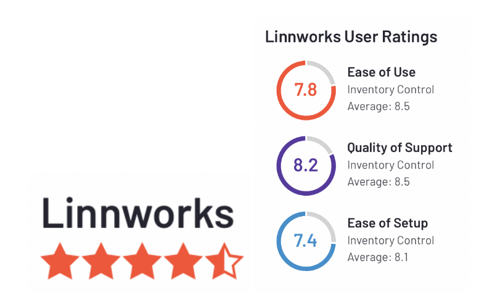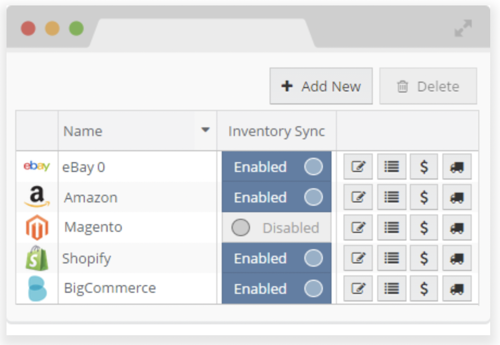Running an eCommerce venture means juggling a multitude of orders flooding in. Fulfilling all of these orders while ensuring timely deliveries can feel like solving a puzzle. This is where order fulfilment software can step in as a game changer.
Whether you're a B2C or B2B; the right order fulfilment software can make all the difference. This article will explore the five best order fulfilment software available. We’ll uncover their key features, pros and cons, and things to consider before investing in eCommerce order fulfilment software.
What is Order Fulfilment Software?
Order fulfilment software is the technological backbone of modern logistics management. It's a suite of tools that automates and streamlines eCommerce order handling. From inventory, order handling to picking, packing, shipping, and tracking, it's all covered.
For businesses striving for operational excellence and smooth customer experiences, eCommerce order fulfilment software is a game-changer. Whether you're hands-on or partnering with a 3PL like PACK & SEND, order fulfilment software becomes your logistics ally.
Let's say a customer clicks that "buy" button on your online store. Instantly, the order fulfilment software springs into action. It updates inventory in real time and creates effective picking lists for warehouse.
What's more, it seamlessly integrates with your eCommerce platforms. So, as orders move from processing to packing, everyone's in sync. Customers can track their packages, you? Well, you're chilling because things are right on track.
Now, imagine managing all of this without the eCommerce fulfilment software. You're wrangling this chaos manually, drowning in spreadsheets and stock-checking. Errors lurking around every corner. It's a logistical nightmare, right? That's where the fulfilment software steps in, turning chaos into seamless efficiency.
Key Features to Look for in Order Fulfilment Software
Inventory Management and Tracking
Simple but crucial: Inventory is a make-or-break for online merchants. Find an inventory and order fulfilment software that lets you:
-
Keep real-time track of inventory
-
Help in demand forecasting
-
Prevent product shortages or excess stock
-
Integrate with multiple sales channels and marketplace
-
Allow for multi-location management
-
Offer quick bar code scanning to speed up receiving
Order Processing Automation
Automation is a time-saver every eCommerce business owner loves. Not all fulfilment software has it. so before picking the best order fulfilment software, ask —
-
Does the fulfilment software sync sales orders across channels?
-
How seamlessly does it integrate with your inventory and warehouse management?
-
Can you process an order from anywhere in real time?
-
Is there secure customer payment processing?
-
Are there tools to automate shipping, delivery, return, and refund?
Seamless Integrations
Compatibility matters! If the software is incompatible with other systems, more work for you.
Does the order fulfilment software sync well with platforms like Magento, Shopify, or BigCommerce? What about critical marketplaces such as Amazon, eBay, and Etsy? Also, let's factor in industry giants like Target and Walmart.
And does it seamlessly integrate with your point-of-sale (POS) systems? Is it equipped for electronic data interchange (EDI)? Does it align with your ERP systems? And pay attention to accounting software and shipping carriers.
Real-time Analytics and Reporting
When it comes to the must-have features for your order fulfilment software, don't overlook reporting and analytics. It lets you evaluate your fulfilment efficiency, identifying growth areas. Your eCommerce order fulfilment software should offer:
-
A quick-view and intuitive dashboard
-
Performance monitoring
-
Improvement insights
-
Comprehensive reports
-
Trends and patterns in data
-
KPI monitoring and goal Tracking
Scalability and Flexibility
Want fulfilment management software that grows with you? Then look for these features:
-
Adapts to evolving business demands
-
Navigates seasonal peaks
-
Accommodates new products and markets
-
Tailors to your workflows
-
Configurable rules
-
Seamless integration with existing tools
Top 5 Order Fulfilment Software For Ecommerce in 2024
1. Linnworks

Discover Linnworks: Your all-in-one cloud-based solution to streamline the entire order process. This multichannel order fulfilment software offers an extensive toolkit. It connects your sales channels, orders, and fulfilment on a centralised platform.
Key Features:
-
Automated order assignment to warehouses for streamlined picking, packing, and shipping
-
Faster fulfilment by linking with 3PLs or warehouses and assigning optimal fulfilment centres
-
Automated order purchase for inventory replenishment when levels drop
-
Optimal inventory rotation ships items nearest to expiration dates first, minimising outdated inventory
-
Seamless integration with 70+ marketplaces and sales channels, including Amazon, Shopify, eBay, etc
-
Robust reporting tools for sales, inventory, and customer insights

Pros:
-
Multi-channel management for handling diverse systems seamlessly

-
Comprehensive order and inventory management
-
Unified shipping integration with all carriers for automatic optimal shipping selection per order
-
Data-rich reports for informed decision-making
-
Customizable and adaptable to unique eCommerce needs
Cons:
-
Steep learning curve for mastering all functionalities
-
Platform's user interface occasionally poses usability challenges
-
The software's bulkiness can pose navigation difficulties
-
Reporting needs to be more intuitive and user-friendly
2. Zoho Inventory

Zoho inventory is a cloud–based order fulfilment software. It helps eCommerce brands streamline workflows and expedite order processing.
Key Features:
-
Comprehensive inventory management modules enriched by reporting, analysis, and lot traceability features
-
Mobile apps that work on Android and iOS devices
-
Common dashboard to obtain an instant snapshot of all sales orders
-
One-click conversion of confirmed sales orders into packing slips
-
Automated import of order details for hassle-free packing slip creation
-
40+ shipping carriers integration for ensuring convenience and efficiency without switching tabs
-
Instant shipping label generation directly from packing slips
-
Real-time shipping rates for each package before order dispatch
-
Automatic tracking notifications post-shipment to keep customers informed
-
Easy dropshipping feature to manage drop shipments when inventory is low


Pros:
-
Painless order tracking for pending, invoiced, packaged, and delivered orders at a glance
-
You can gain valuable insights into order statuses, stock levels, and customer preferences
-
Automatic packing slips and extensive carrier options simplify the shipping operation
-
Integration with AfterShip ensures transparent package tracking, bolstering customer satisfaction
Cons:
-
Lack of tags and segregation might make product searching cumbersome
-
Certain advanced functions require more understanding to utilise fully
-
The pricing, based on monthly order volume, should be evaluated as per business needs
3. Ordoro

Ordoro – your all-in-one shipping and order fulfilment software for efficient inventory and shipping management.
Key Features:
-
Comprehensive dashboard with all your shipping carriers, sales channels, and ship-from locations in one place
-
Built-in automation for streamlined inventory management and shipping workflows.
-
Automate tags and shipping presets for seamless order processing
-
Advanced pick and pack workflows for accurate order fulfilment
-
Barcode scanning and order verification capabilities for improved shipping accuracy
-
Robust inventory management tools for supplier management, kitting, bundling, bill of materials, etc.
-
The comprehensive suite of inventory management tools
-
Open API for platform-agnostic integration
Pros:
-
Access to exclusive, heavily-discounted shipping rates
-
User-friendly software and excellent customer support ensure hassle-free onboarding
-
Top-notch assistance by connecting with real people without filling out support tickets
Cons:
-
Long intervals between updates; More frequent software updates would be preferable
-
While the entry-level is affordable at $59 per month, more robust features are available at higher price points
4. Shipmonk

Shipmonk offers a robust 3PL platform. Ideal for DTC eCommerce businesses of any scale seeking to simplify fulfilment complexities. The advanced, omnichannel order fulfilment software powers inventory, shipping, and warehousing.

Key Features:
-
Omnichannel fulfilment manages inventory and shipping for various DTC sales channels
-
The top choice to strengthen retail distribution for B2B eCommerce orders
-
Complete transparency thanks to order timeline, end-to-end order logs, order billing breakdowns, advanced reporting, and SKU photos
-
Comprehensive reporting suite for clear and data-driven insights
-
Sterilisation keeps tabs on the exact unit shipped to each customer
-
Lot control to trace inventory for each production and expiration date
Pros:
-
The interface is highly intuitive and integrates well with various platforms
-
Efficient returns management to generate return labels effortlessly and track the status of returned items
-
Automatic slotting monitors sales velocity and places goods in optimal warehouse locations
-
The auto-merge feature combines unfulfilled orders for the same recipient, reducing shipping expenses and speeding up delivery
Cons:
-
Pricing might be relatively higher for smaller businesses or those with lower order volumes
-
It integrates with popular platforms, but niche platforms might not be supported
-
Steep learning curve for newcomers or those without dedicated technical resources. However, online resources and support are available.
5. ShipHero
Enter ShipHero. A dynamic warehouse management software that caters to eCommerce brands and 3PL providers. With a suite of modules, it's your all-in-one solution for order management, inventory control, and shipping management.

Key Features:
-
An array of essential inventory management features include tracking, replenishment, and reporting
- Convenient mobile app for swift and hassle-free cycle counts
-
Simplified management of multiple warehouses with tools like inventory transfers and order routing
-
Multi-carrier logic that automatically selects the most economical shipping method across carriers
- Simplified order management through seamless order integration, order routing, bulk shipping label printing, etc.
-
Dynamic slotting to handle multiple pick bins and bin transfers effectively
Pros:
-
One-click integration and open API framework
-
Specialised order fulfilment software for 3PLs
-
Built-in return management capabilities
Cons:
-
Some users have reported clunky dashboard experiences
-
Limited warehouse networks may restrict international market expansion, as all facilities are based in North America
Considerations for Choosing the Right Order Fulfilment Software
Understanding Your Business Needs and Goals
Before deciding, evaluate your business requirements. Think about your order volume, product types, and future growth projections.
Integration Compatibility with Existing Systems
Ensure that the chosen software seamlessly integrates with your current systems, including eCommerce platforms, accounting software, and CRM systems.
Total Cost of Ownership and ROI Analysis
While cost is a factor, focus on the software's value to your operations. Calculate the total cost of ownership. And assess the potential ROI through improved efficiency and customer satisfaction.
Why Choose Pack & Send For Your Ecommerce Order Fulfilment Needs?
Tailored Logistics Solutions
PACK & SEND specialises in customised logistics solutions for businesses of any size.
Efficiency Without Upfront Costs
You pay only for the services you use, ensuring cost-effectiveness.
Effortless eCommerce Fulfilment
No matter if you sell on Amazon, eBay, or your own website, PACK & SEND provides swift and efficient eCommerce fulfilment and distribution solutions.
Cutting-Edge Fulfilment Technology
Our advanced order fulfilment technology integrates with your online store, automating order processing.
No Limits, No Contracts
With no minimum order quantity and no fixed contract period, you can scale your business without constraints.
Reliable Delivery and Savings
As Australia's top parcel courier and freight delivery reseller, we negotiate competitive delivery prices. Our integrated technology optimises carrier options and simplifies billing.
Ready to optimise your logistics and eCommerce potential? Request a quote from PACK & SEND today!
Frequently Asked Questions (FAQs)
What is order fulfilment software?
Order fulfilment software is a suite of tools to automate and streamline order handling. It covers inventory management, order processing, picking, packing, shipping, and tracking.
Is an order management system a CRM?
While both order management systems (OMS) and customer relationship management (CRM) software handle customer-related processes, they serve different purposes. An OMS focuses on order processing, inventory management, and fulfilment. Whereas a CRM primarily manages customer interactions and relationships.
What are the features of order fulfilment software?
Key features of order fulfilment software include:
-
Real-time inventory tracking
-
Order processing automation
-
Integration with eCommerce platforms and marketplaces
-
Analytics and reporting
-
Multi-location management
-
Shipping and delivery management
-
Scalability to adapt to business growth
Why should you use order fulfilment software?
Order fulfilment software offers numerous benefits:
-
Automation reduces manual tasks and errors and improves efficiency.
-
Integration and analytics streamlines operations
-
Efficient processes reduce operational costs
-
Timely and accurate deliveries boost customer satisfaction




